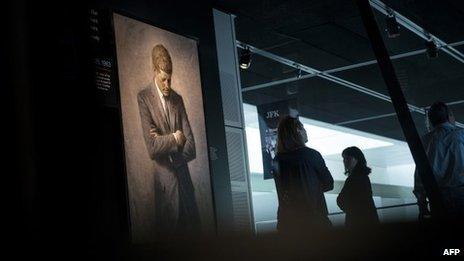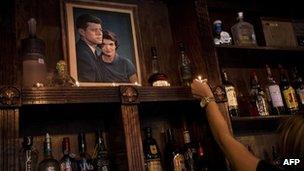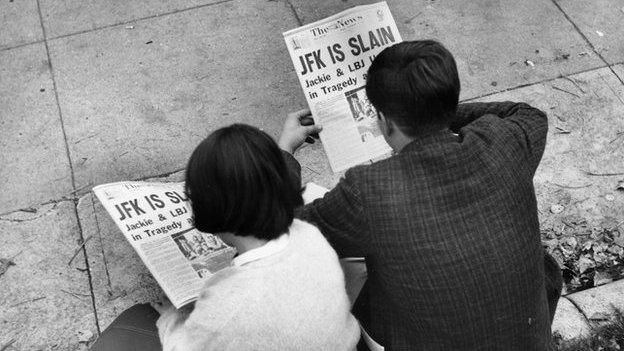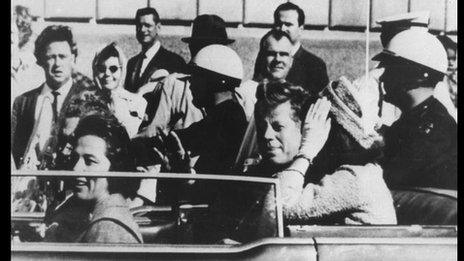Why we remember JFK
- Published
- comments

"Something is wrong. Something is terribly wrong."
The alarm in the radio reporter's voice reaches out across five decades. At first simply dramatic, then horrified, traumatised, as he describes Kennedy's last motorcade, the Secret Service man spread-eagled across the car, a flash of Jackie's pink dress.
Later, another man intones: "I have to tell you, the president of the United States is dead."
The numb grief expressed in that moment spread out in shockwaves across the United States and the world.
This week on the BBC we will be asking what it meant then, and what it means now.
Shock across the world
Those shockwaves rippled across the Atlantic and into the home of a little boy in Surrey. I was six when JFK was murdered.
I remember vividly that my parents were out for the evening and my grandparents were babysitting.

In death, Kennedy remains a larger-than-life figure
I knew from the TV that someone in America had been killed and it was a very bad thing indeed. The rotating globe on BBC1 slowed down to a funereal pace.
That may well be a false memory, but it is my memory. I muddled this tragedy abroad with the threat of nuclear war, until I was reassured. When an old guy like me has hazy memories of the man and his murder it's a salutary reminder that this is ancient history for very many Americans.
But for many of those who were adults at the time it was the death of hope.
JFK meant youth and vitality, the leader of a new generation at the helm shaking off the fusty, cobwebbed chains of the past, among them Canadian Prime Minister Pierre Trudeau, and in Britain, Harold Wilson and his "white heat of technology", external.
But it was JFK's good looks and unstuffy style, a Catholic who broke America's White Anglo-Saxon Protestant mould, a scion of America's egalitarian royalty, who embodied the idea that people could forge "a new world of law, where the strong are just and the weak secure and the peace preserved".
Much of this is maybe romantic nonsense.
A younger generation may be more struck that his obsessive womanising was kept a closely guarded secret by Washington's elite and that his ill health was kept from the voters by his wealthy family.
If Kennedy had lived Lyndon Johnson would never had been able to prove that he was not an unmitigated scoundrel.
A scoundrel Kennedy's successor was and a bully, and a cheat. But the mitigation was this profane Southerner who often seemed to believe in nothing but power, shone with belief in a greater good as he seized the chance to force through civil rights legislation which saved his country from schism.
We can never know, obviously, but to my mind it is likely the brutal unfairness would have continued under Kennedy.
Of course, Johnson's insecurity about foreign policy pushed him to wade ham-fisted deeper and deeper into Vietnam, pushing his country to a different schism, a division of age and politics, rather than race and politics.
That probably wouldn't have happened either if Kennedy had lived.
The death of hope has echoes today, perhaps. Maybe Barack Obama is the Kennedy who lived. What JFK might have become had he lived, a second-term president, flawed and real, falling short of the aspirations invested in him.
A reminder of what impossibly high hopes are doomed to become - disappointments.
But the hope embodied in JFK has continued to burn eternally bright because his light was cruelly, prematurely, snuffed out.
- Published8 November 2013

- Published18 October 2013
